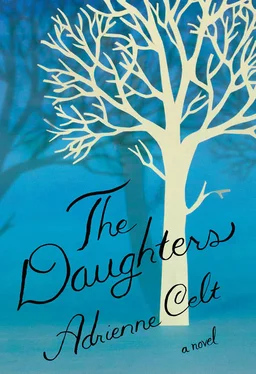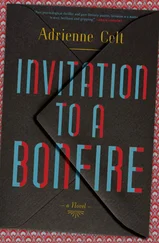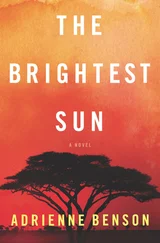“There you go.” He handed it to me — I shook the stiffness out of my fingers before accepting. “Volume is up to the max. You should be able to hear it from anywhere in the house now.”
“Oh joyous thing.” I yawned. Then I caught myself. “Wait. You found my phone?”
“Wasn’t lost.” He shrugged and smoothed a navy blue jacket over his shoulders. “We’re doing an open rehearsal for a set of local elementaries today. And then I have to meet with Stan, so maybe seven?”
“Okay.” I scrolled through my missed calls. Nothing essential. At least, nothing I wanted to return.
Nothing from my baba Ada. Though that was natural.
Kara stirred, and I adjusted her so she could begin nursing. Her quiet supping sounds. John leaned over and kissed her ear and then, after a split-second pause, mine. I couldn’t help but shift. So many mouths occupied with my body.
One possibility is that my husband knows the child we’ve just brought into the world is not his. Another possibility is that he doesn’t. After all, John loves her. That is not in dispute.
I watched him pull his gray wool coat over the blazer, wrap a scarf around his neck, and make sure he had the right music in his leather satchel before putting on his gloves. Then he waved. Slipped through the door and was gone.
Most people in my position would take comfort in the fact that conception dates are approximate at best. The, shall we say, soft-focus view of my daughter’s provenance is that no one can be sure about it. And there are moments when I can almost imagine him at the source of her. Hollows left in the pillows by the weight of a head, John hefting himself off the mattress to walk naked into the kitchen for a glass of tap water.
Still, I can’t help but know what I know. I know when my heart rate increases by a single point, know the placement of my ribs with chiropractic precision. Feeling a child wake up inside me was as obvious and instantaneous as a slap to the face.
What I didn’t know was where my phone had gotten to, and it disturbs me, the ease with which John plucked it from the ether. If he’s aware that Kara’s blood is not his own, then the question of what he might do next is still an open one. Why hasn’t he said anything? Why does a part of me wish he would? I’m sitting on the edge of a precipice, legs dangling into the dark.
Small things: a lost phone, the unnaturally blue eyes of a child.
Outside the storm is still raging, the sky shedding snow. Not as loud as last night, perhaps, but just as angry.
A cross the room, out of my reach, our stereo sits on a shelf with recordings and ruffled sheaves of sheet music. A thin smattering of selections on vinyl, which is John’s pretension, not my own. I’ve never understood his fascination with how music is preserved. I’m interested in how it’s made. Living inside music that lives in me, so that we, the song and I, are a continual unfolding out of one another, a growing vastness, an emerging pattern.
John left this morning to rehearse La Bohème and I did not. For now, this is the way of things.
It seems odd to me to think of my voice scratched into a wax cylinder, trapped like a spirit caught in a jar. Worse still a computer chip: the tip of my tongue striking my teeth, the glottal contractions in my throat, even the air that circulates through my lungs and my blood, all somehow frozen onto a thumb drive that I can toss into my purse. A song is best sustained through performance, where it can respond to the world around it. Be shaped by its surroundings. Made new. In that way it’s like a story, never so alive as when it’s being told.
From my seat I take stock of the operatic scores I’ve lined up to read as I nurse, each with a variety of recordings tucked beside it. Just tools. Their usefulness predicated on the belief that this pause in my career will end, and end well. When I take on a new role, I like to read the full score of the opera first, sing it through, to let my body interpret the notes on the page. Then I listen to all the recordings I can get my hands on to make sure I’m not imitating someone else’s voice.
Kara observes me, fighting off sleep, and I wonder what I could say to her to help her relax. Release her hold on the details she’s drinking in from around her so we could both get a moment or two more of rest. The doctor, after all, told me that rest was what I needed. “Your body has been through a struggle,” she said. “You need to take some time off to get your strength back.”
I could tell Kara a story. She has a lot to learn about me, about the past. Where she comes from, where she’s going. And anyway, isn’t that the function of stories? To teach our brains to dream? It would be daunting to fall asleep into the noise of complete darkness, infinite probability. Without the guide of a little narrative, a little magic, how would we know where to go when we closed our eyes?
Despite her restiveness, the baby barely makes a sound. Sometimes soft snufflings, yawns that expand her entire body so she seems to be unkinking at the joints. We named her Karina, but I haven’t called her that since John and I made the official declaration for her birth certificate. She’s Kara, plain Kara. In the muted light of day, she doesn’t mind that it’s snowing outside, that a slick mix of sleet and ice and rain is tapping on the tall windows of the living room. To her, the entire world is the chair I sit in, or perhaps just the length of my arm where she lays. To her, the sun is a bent lamp at my elbow, and the whole of existence is quiet, because I made it that way. Tappings, stockinged footsteps, hush, the baby is sleeping.
Since Kara was born I haven’t sung a note. I’ve lain in bed with her soft weight splayed across my chest, and I’ve inhaled the milkfat scent of her hair. I’ve passed her to my husband and watched him press his nose against hers, stare cross-eyed into her pupils, smile his smallest, truest smile. I’ve seen other, more complicated shifts in his expression too, but we don’t talk about them. I wrap silence around myself like a blanket, like I’m always cold. Looking at my scores makes me shiver. Waking up with Tosca in my head fills my lungs with ice. Kara is so small, just a creature of cheeks and folds, eyes and rumples. I wrap silence around her, too, and tell myself it is to protect her. To keep her core temperature high, so the breath she sighs out at me will heat my neck in tiny bursts.
My grandmother Ada, babenka Adelajda , tells me that when I was first born I blinked my eyes with the regularity of a metronome. As a child I ran down the tiled aisles of the grocery store leaping in time with crescendos in the piped-in music. If the song was up-tempo I got mischievous, pinching all the grapes in a bunch to find the crisp ones and popping them in my mouth when no one was looking. Sometimes I tried to sneak one bite of every kind of fruit and vegetable in the store: a bean sprout; a lettuce leaf, with its torn green taste; an apple, bitten down to the white on one side and placed back on the pile with its shiny, unadulterated face forward.
If the music was slow, I lost the will to walk. My baba Ada held my hand and asked, “Is that the weight of the world I see on your shoulders?” I leaned into her, burying my face in her side and letting my knees buckle ever so slightly. But it wasn’t sadness, exactly, that stilled me. I wanted to lie on the floor and progress at the same pace as the chords. Toss an arm out, then rest. Roll onto my stomach, then rest. My body was starting to ascertain that the quiet moments between notes, between sounds, were as important as the sounds themselves.
The wind blows water against the window in waves, as if it were a body heaving backwards and thrusting itself into the glass, demanding entrance. We’re close enough to the beach to be a target for the lake effect, frozen raindrops assaulting our building in droves, snow accumulating at a magnitude. Ours is a nice neighborhood in the north of the city, but there is no protection anywhere from the weather. You just get used to it. The pounding is so regular it’s almost soothing, at least with a radiator near my knees, hissing steam in concert. My spine cracks as I stretch in my chair, and the child stretches her fingers, which look boneless.
Читать дальше












